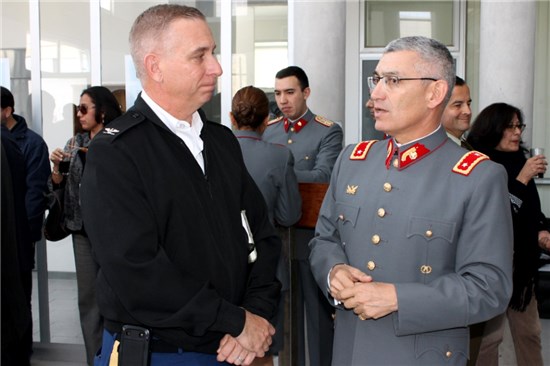 |
| In this image released by Joint Task Force 136 (Maneuver Enhancement Brigade), Brigade Commander Col. Lee Schnell (left) discusses observations made during the Volcano VI emergency exercise with Chilean Army Brig. Gen. Miguel Alfonso Bellet (right), commander of the 1st Brigade "Coraceros," in Arica, Chile, Aug. 20, 2014. This training event, which included a simulated earthquake and volcanic eruption, offered members of the Chilean emergency response community an opportunity to share best practices with representatives of the Texas Military Forces and the Texas Department of Public Safety. (Photo by Sgt. 1st Class Alfonso Garcia) |
Story by Sgt. 1st Class Daniel Griego
ARICA, Chile - Natural disasters are a constant global threat, and response measures can vary wildly from nation to nation. The emergency preparedness communities of Chile and Texas are looking to bridge that gap in consequence management with long-term exchanges of best practices and training events. The most recent of which, Chile's Volcano VI exercise, brought together representatives of the Texas Military Forces, the Texas Department of Public Safety, the Chilean Army, and Chilean civilians in a robust, simulated incident in Arica, Chile. The scenario, held Aug. 18-22, featured a simulated earthquake and volcanic eruption that stressed the capabilities and cooperation of the Chilean Army, the Chilean Office of National Emergency Management, Ministry of Interior, the Carabineros de Chile (Federal Police), the Regional Fire Department, and many local civilian agencies.
"It was very interesting to see how another country took on disaster preparedness and some of the things that they do that are different from us, but are very effective," said Texas National Guard Col. Lee Schnell. As the commander of Joint Task Force 136 (Maneuver Enhancement Brigade), the Guard unit responsible for the FEMA Region VI Homeland Response Force mission, Col. Schnell has a vested interest in disaster response, having participated in and observed dozens of exercises during the last four years.
"Volcano VI took place in Arica this year," said Chilean Army Col. Edmundo Villarroel Geissbuhler, "and its purpose was to provide the civilian authorities a training opportunity, in order to verify and update their disaster relief contingency plans. It also allow them to check their communications flows, and interagency coordination, determining the needs of personnel, materiel, equipment, and other resources, to successfully face an emergency or disaster caused by nature or human influence."
Not unlike our response plans and interagency agreements here in the United States, the disaster operations in Chile must be tested and certified in accordance with high standards of efficiency.
"The purpose of the exercise was to validate the current emergency plans incorporated by the various participating agencies in attendance," said Sgt. 1st Class Alfonso Garcia, the International Affairs NCO for the Texas Military Forces. "The exercise players used a computer system that controlled and monitored the development of events during the disaster exercise."
The exercise primarily took place at the University of Tarapaca. Members of the Texas Military Forces and Texas Department of Public Safety were invited in order to provide feedback and share best practices from their own disaster management experience.
"Here was an exercise and you had elected officials, their staffs, all engaged in this exercise, and that's difficult to do anywhere," said Schnell. "They really immersed themselves in the exercise. That was probably the thing that most impressed me, how everybody came to the table, it wasn't just the military and first responders."
Throughout the week, Chilean authorities met with the U.S. delegation to discuss not only the ongoing exercise, but also previous encounters with disaster response, such as this past April's magnitude 8.2 earthquake that hit Chile's coast and created a seven-foot tsunami. This background in natural incidents was instrumental in their successful validation at the university and in effectively discussing large-scale response measures. Other topics of discussion included logistical hurdles created by natural disasters and how to reach geographically isolated areas within their respective areas of responsibility.
"During the exercise, they had the chance to interact with the Chilean representatives involved in it," said Villarroel Geissbuhler, about the Texas visitors. "They met representatives of the Chilean National Police, Army, government, Air Force, Navy, NGOs, etc., discussing with them different topics of mutual interest. At the end of the exercise, Col. Schnell also provided input during the AAR, not only from his perspective, but also from the Texas Military Forces and the U.S. Army South perspective, allowing the Chilean authorities to hear a different point of view. That will certainly be used as part of the lessons learned."
Interagency cooperation was a recurring theme for the week, as the two nations shared with each other how their militaries worked alongside civilian authorities. By inviting both civilian and military members of Texas' consequence management community, the Chilean forces were able to gain a neighboring perspective on asset allocation and the need to include all stakeholders in support of the citizens.
"While we attended the exercise in the role of observers and not evaluators," said Texas Department of Public Safety Capt. Luis Najera, "I feel it was important for the Chilean military forces and civilian authorities to understand the roles between the Texas Military Forces and the Department of Public Safety in Texas' response to emergencies. The Chilean government clearly understands the need to have all their governmental resources working together to respond to emergencies and natural disasters."
With so much on the line, the priority throughout the exercise was how best to serve the citizens of Chile in the fight to save lives. By sharing best practices through long-term partnerships like this, service members, first responders, and civil servants ensure a state of constant improvement and cooperative relationships.
"There was no doubt," said Najera, "that there was a strong commitment by both civilian and military authorities to continue to improve their country's emergency management response."